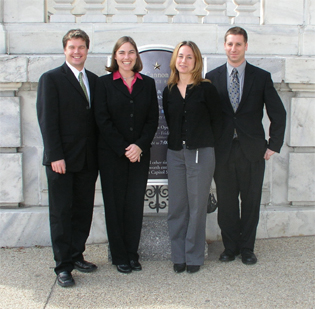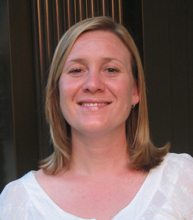Geotimes

Untitled Document

Profiles:
News
about people from AGI and its 43 member societies
Archive of past
Society Page/Profiles stories by date
Geoscientists meet Hill policy
 Every
year, a cadre of scientists descends on congressional offices in Washington,
D.C., sponsored by more than 30 professional and scientific organizations, in
a program managed by the American Association for the Advance-ment of Science.
One thing that has brought this year’s geosciences congressional fellows
to the Hill, they say, is the desire not necessarily to bring science to the
political process, but to bring policy back to science.
Every
year, a cadre of scientists descends on congressional offices in Washington,
D.C., sponsored by more than 30 professional and scientific organizations, in
a program managed by the American Association for the Advance-ment of Science.
One thing that has brought this year’s geosciences congressional fellows
to the Hill, they say, is the desire not necessarily to bring science to the
political process, but to bring policy back to science.
Four geoscience fellows already serving on Capitol Hill (left to right): Steve
Quane, volcanologist; Eryn Robinson, geotechnical engineer; Nicole Gasparini,
river geomorphologist; Josh Trapani, paleontologist.
Eryn Robinson, a geotechnical engineer, says her sponsoring society, the American
Society of Civil Engineers, perceives her experience on the Hill as an advantage
to her entire professional community and encourages her to “come back to
communicate policy issues to engineers.” Working for the Republican majority
on the Senate Committee on Environment and Public Works, Robinson will cover
nuclear energy issues, as well as the response to hurricanes Katrina and Rita
during her yearlong fellowship.
A Columbus, Ohio, native, Robinson, 29, says that she first became interested
in natural hazards as an undergraduate civil engineering student at Princeton
University, participating in a geohazards course taught by Gregory van der Vink
(see Geotimes, November 2005).
Robinson mapped flood hazards and conducted post-disaster fieldwork for a Federal
Emergency Management Agency contractor, before returning to school to pursue
professional engineering.
Most recently based in Alexandria, Va., Robinson worked for a defense contractor
examining data on underground nuclear tests for insights on how to deal with
“hard” and deeply buried targets, such as underground tunnels or bunkers.
Such work also piqued her interest in armed services issues, in addition to
other topics she will cover for the Senate committee.
The fellows, however, often find themselves tackling unfamiliar issues. Nicole
Gasparini, for example, the Geological Society of America fellow, has taken
on human rights in her position in the office of Rep. Edward Markey (D-Mass.).
Gasparini also recently researched potassium iodide for an amendment Markey
sponsored for responses to attacks on nuclear power plants (the chemical can
stop biological uptake of radioactive iodine). Researching the topic showed
her how difficult it can be for science to translate into scientific policy
solutions. The 33-year-old hydrologist and river geomorphologist has also covered
issues closer to home, though, such as recent flooding in New England and climate
change.
Gasparini, who grew up in Buffalo, N.Y., wants to bring policy back to her research,
she says. (She remains active in her current geomorphology research at Yale
University, where she was a postdoctoral fellow before heading to Washington.)
Students are not necessarily best served by solely academically oriented teaching,
she says. Plus “it’s interesting to me to be on the political side,
to see how scientists present themselves” to policy-makers, she says, in
situations where both sides do not necessarily understand the other side’s
culture.
Josh Trapani, a paleontologist who is the American Geophysical Union fellow,
says that he was more interested in writing and politics while growing up on
Long Island, N.Y., than science. Trapani, 31, was instead “sucked in”
by an introductory college geology course. Learning about geologic time and
understanding “how things came to be” made him into a “paleo-guy,”
eventually earning a Ph.D. in geology at the University of Michigan in Ann Arbor.
Trapani’s most recent work, as a postdoctoral researcher at the University
of Colorado in Boulder, focused on the evolution of teeth in several species
of fish — a far cry from the meetings, memos and letters he focuses on
now in his research on public lands and NASA funding, serving in Sen. Dianne
Feinstein’s office (D-Calif.). The possible loss of funding for NASA’s
life sciences and aeronautics research could impact such California institutions
as NASA Ames in Mountain View and the Jet Propulsion Lab in Pasadena, he says.
 These fellows say that they have always
been interested in politics. “I love doing science for science’s sake,
but I want to get information to policy-makers so they can make the best decisions,”
says Kit Batten, who will start in January in Sen. Joseph Lieberman’s office
(D-Conn.), as the congressional fellow sponsored by the Soil Science Society
of America, American Society of Agronomy and Crop Science Society of America.
These fellows say that they have always
been interested in politics. “I love doing science for science’s sake,
but I want to get information to policy-makers so they can make the best decisions,”
says Kit Batten, who will start in January in Sen. Joseph Lieberman’s office
(D-Conn.), as the congressional fellow sponsored by the Soil Science Society
of America, American Society of Agronomy and Crop Science Society of America.
Soil microbial ecologist Kit Batten will start her yearlong fellowship in Sen.
Joe Lieberman’s (D-Conn.) office in January.
As a chemist turned soil microbial ecologist, Batten’s focus on invasive
species (and their effects on soil) brought her to Washington, D.C., once before,
to intern with the Global Invasive Species Programme, during her Ph.D. work
at the University of California, Davis. Batten, 30, currently works for the
American Institute of Biological Sciences, as a postdoctoral researcher addressing
aspects of the National Ecological Observatory Network program. Batten says
she is looking forward to working in a congressional office, where she will
focus primarily on climate and energy issues, as well as the Endangered Species
Act.
Steve Quane, the William L. Fisher Congressional Fellow sponsored by the American
Geological Institute, sees the fellowship as a great way to get an insider’s
view of politics (see Geotimes, November 2005). Like congressional staffers
from outside academic science attempting to pick up the science that they need
as quickly and accurately as possible, grasping the political process from inside
academia is “nearly impossible,” says Quane, a 30-year-old volcanologist
originally from Colorado, who is now working in the office of Rep. Tom Udall
(D-N.M.). After their work is done on the Hill, he says, the fellows will have
important insights to bring back to the scientific community.
Naomi Lubick
Links:
"The
Increasing Costs of U.S. Natural Disasters," Geotimes, November 2005
Back to top
Untitled Document

 Every
year, a cadre of scientists descends on congressional offices in Washington,
D.C., sponsored by more than 30 professional and scientific organizations, in
a program managed by the American Association for the Advance-ment of Science.
One thing that has brought this year’s geosciences congressional fellows
to the Hill, they say, is the desire not necessarily to bring science to the
political process, but to bring policy back to science.
Every
year, a cadre of scientists descends on congressional offices in Washington,
D.C., sponsored by more than 30 professional and scientific organizations, in
a program managed by the American Association for the Advance-ment of Science.
One thing that has brought this year’s geosciences congressional fellows
to the Hill, they say, is the desire not necessarily to bring science to the
political process, but to bring policy back to science. 
 These fellows say that they have always
been interested in politics. “I love doing science for science’s sake,
but I want to get information to policy-makers so they can make the best decisions,”
says Kit Batten, who will start in January in Sen. Joseph Lieberman’s office
(D-Conn.), as the congressional fellow sponsored by the Soil Science Society
of America, American Society of Agronomy and Crop Science Society of America.
These fellows say that they have always
been interested in politics. “I love doing science for science’s sake,
but I want to get information to policy-makers so they can make the best decisions,”
says Kit Batten, who will start in January in Sen. Joseph Lieberman’s office
(D-Conn.), as the congressional fellow sponsored by the Soil Science Society
of America, American Society of Agronomy and Crop Science Society of America.